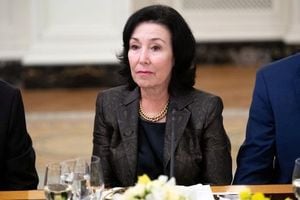In a region where alliances can shift as quickly as desert winds, the Saudi-Pakistan Strategic Mutual Defense Agreement, signed on September 17, 2025, has sent ripples through diplomatic and security circles across the Middle East and South Asia. The timing of the pact—just days after an Israeli strike on Hamas officials in Doha, Qatar—has only fueled speculation about its true meaning and the future of regional security arrangements.
According to the official statement from the Pakistani prime minister’s office, the agreement is straightforward on paper: “any aggression against either country shall be considered an aggression against both.” That’s a bold declaration in a volatile neighborhood, and it’s no wonder that the announcement drew immediate attention from analysts, officials, and the media alike. But as with so many things in geopolitics, the devil is in the details—and, as of now, those details remain shrouded in ambiguity.
Early commentary, as reported by the Middle East Institute (MEI), was quick to leap to dramatic conclusions. Some analysts claimed that Saudi Arabia was now effectively under a Pakistani nuclear umbrella, with suggestions that Islamabad might even be willing to use nuclear weapons to defend the Kingdom. Stimson Center analyst Mohammad Salami stated, “Saudi Arabia gains access to a nuclear umbrella and potentially nuclear weapons.” Riad Kahwaji, a veteran Gulf defense analyst, went so far as to say the pact “now puts Riyadh under the nuclear umbrella of Pakistan.” Even respected historian Prof. Juan Cole called it an “Islamic NATO,” speculating that Pakistan might consider using nuclear weapons against Israel in the event of a similar attack on Riyadh.
Yet, as MEI’s F. Gregory Gause III and other experts have cautioned, reality is far more complicated. When pressed about the nuclear aspect, a Saudi official offered only that the deal “encompasses all military means.” Pakistan’s defense minister initially told television audiences that Pakistani capabilities “will be made available” to Saudi Arabia, but later clarified that the nuclear element was “not on the radar.” The official Pakistani government statement, notably, made no mention of nuclear guarantees at all.
This kind of ambiguity is hardly new in the world of extended deterrence. Both Riyadh and Islamabad have every reason to want their potential adversaries to believe the commitment is ironclad. But as Gause points out, “the complexities of extended deterrence are immense.” Despite the heated rhetoric, there is little evidence that Pakistan would automatically respond with force—let alone nuclear force—should Saudi Arabia come under attack.
Historically, Pakistan and Saudi Arabia have enjoyed close military ties. Pakistan sent 11,000 troops to the Kingdom in 1990 following Iraq’s invasion of Kuwait, and at one point in the 1980s, some 20,000 Pakistani troops were stationed in Saudi Arabia. Defense and military training agreements date back to 1967 and 1982. But the nature of the threats facing Saudi Arabia today has evolved. The most pressing dangers are not conventional invasions, but rather missile and drone strikes—like the Iranian attack on Saudi oil installations in September 2019, or the more recent strike on an American airbase in Qatar in June 2025. The Houthis in Yemen have also targeted Saudi and Emirati sites with drones and missiles throughout the last decade.
Would Pakistan really risk war with Iran, Israel, or even the Houthis to defend Saudi Arabia in such scenarios? The answer, according to most observers, is a resounding “probably not.” Pakistan’s military is primarily focused on deterring India, its longstanding rival to the east. Opening a new front with Iran would risk destabilizing Pakistan’s southwestern border and potentially alienate a crucial neighbor. An attack on Israel, another nuclear power, would carry even greater risks, including a possible rupture in relations with the United States. As for the Houthis, Pakistan has previously declined to join Saudi-led military campaigns in Yemen, most notably in 2015.
Economic considerations further complicate the picture. Saudi Arabia’s trade with India reached a staggering $41.88 billion in fiscal year 2024-25—eight times the volume of its trade with Pakistan. The two countries even held joint military exercises as recently as August 2025. For Crown Prince Mohammad bin Salman, the focus is increasingly on economic transformation and regional stability, not military adventurism. Vision 2030, his ambitious plan to diversify the Saudi economy, depends on attracting investment, boosting non-oil trade, and maintaining strong ties with global partners like India. A full-blown security commitment to Pakistan could jeopardize these goals.
So, if the Saudi-Pakistani pact isn’t really about a nuclear umbrella or automatic military intervention, what is it about? As Gause notes, “the value of the agreement is more diplomatic than military.” For Saudi Arabia, the deal serves as a signal to Washington: if the United States cannot guarantee the Kingdom’s security—especially after the Israeli strike on Qatar—then Riyadh has other options. For Pakistan, the agreement reaffirms a longstanding security relationship and opens the door to increased Saudi economic support at a time when Islamabad faces persistent financial challenges.
The Trump administration, for its part, has tried to reassure its Gulf allies. After the Israeli attack on Qatar, President Trump issued an Executive Order on September 29, 2025, committing the United States to the defense of Qatar. His May 2025 visit to Saudi Arabia, Qatar, and the UAE—his first planned foreign trip of his second term—was intended to underscore the importance of these partnerships. Yet, as the MEI article observes, there is a growing perception in the region that Washington now views the Gulf states more as business partners than as core security allies. American arms sales, once seen as evidence of a broader strategic commitment, are increasingly perceived as just another commercial transaction.
Uncertainty hangs over the region. Iran, weakened by recent setbacks, remains unpredictable. Israel’s actions in Gaza, Lebanon, Syria, and now Qatar have further unsettled the regional order. But the greatest source of unpredictability may be the United States itself. As Gause writes, “the main worry now is that the Gulf states are being abandoned by Washington, or at least Washington is unwilling to prevent Israel from directly attacking its Gulf partners and disrupting the regional order more generally.”
For now, the Saudi-Pakistan defense agreement stands as both a reminder of old alliances and a reflection of new realities. It’s a diplomatic maneuver, not a military game-changer. The real test will come not in the words of official communiqués, but in how Riyadh, Islamabad, and Washington respond to the next crisis—whatever form it may take.




